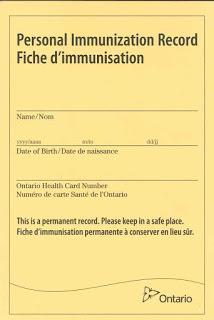Now, I know there are moms out there who have mixed or negative feelings about vaccines. One of my very first interviews for This Mom Loves was with a doctor whose medical expertise I trust wholeheartedly. I asked her what she thought, and this was her reply:
"Vaccinations are the biggest improvement to public health after handwashing for prevention of disease, so I'm a pro-vaccine advocate. There is evidence now that there is no link between any vaccines and autism and the safety and efficacy data on the vaccines that we use are excellent, so I am a great pro-vaccinator. I encourage my parents to understand that primary prevention is your best strategy, and this whole concept that getting a disease makes the immune system tougher—there is no science behind that at all."
I also have mom friend who is also a doctor, and whose children are similar ages to mine, and I have followed her lead when it comes to vaccinating our children—which is to say that we've followed Ontario’s publicly funded immunization schedule thoroughly.
Parents are naturally concerned about any medication being given to their children, and the Ontario immunization site says this about vaccine safety:
"In Canada, we have very strict controls for making vaccines. All vaccines are tested to make sure they are both safe and effective. The most common side effects are mild pain, swelling and redness where the injection was given.
Some infant vaccines may cause a low-grade fever (approximately 38°C) or fussiness for a day or 2 after the injection. Doctors may recommend acetaminophen to prevent fever and pain. Serious side effects are rare."
While it's very important to keep our newborns and babies safe from disease, school entry is another essential time to make sure your child is protected...and will also not infect his or her classmates (especially vulnerable children who may not be able to be vaccinated themselves for medical reasons).
In order to attend school in Ontario, children must be immunized against tetanus, diphtheria, polio, measles, mumps, rubella, chickenpox, meningococcal disease and whooping cough (unless they have a valid exemption). Cost is not an issue: vaccines in the routine schedule are provided free of charge.

A piece of parenting advice, now that my girls are 10 and 8: make sure you bring your children's immunization cards with you every time you go to the doctor for a vaccination. It was current when I registered my girls for school, as I had to show proof of their immunizations. After that when they returned for further vaccines, there were a couple of times I didn't have the card on me and didn't worry about it because I knew the doctor's office would always have the records.
Then, when my daughters were in school, I received notices that their immunization records weren't up-to-date at our local health unit (because doctor's offices don't update those records), and I needed to send proof of the vaccinations to them, which I then had to get from the doctor. Not a big deal, but a minor inconvenience that could have been avoided if I had been diligent about bringing the immunization cards with me, and letting the Health Unit know afterwards.
As children get older, vaccines are also offered for meningococcal disease, Hepatitis B and human papilloma virus (HPV). There was an expert on Your Morning this week discussing how HPV rates have seen a huge decline over the past ten years since the introduction of that vaccine, which is pretty amazing. Also, don't forget there are necessary boosters for teens and adults, too, so check out Ontario's Routine Immunization Schedule to be sure everyone in the family is fully immunized...including the parents!
Here you see my beautiful girls on the first day of school: new outfits, backpacks stocked...and fully immunized to be safe from disease.

Disclosure: This post was developed in association with the Ontario Ministry of Health and Long-Term Care. The opinions are my own.


